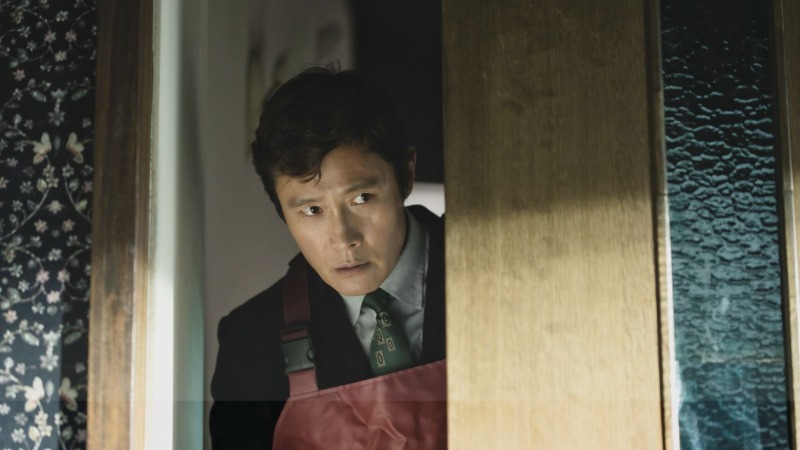NYFF: Park Chan-wook’s No Other Choice Nails the Joke, Then Keeps Telling It
Park Chan-wook's latest is a viciously funny and beautifully made pulpy corporate satire that can’t stop looping its own punchline.

At the top of No Other Choice, Park Chan-wook’s adaptation of Donald Westlake’s 1997 novel The Ax, a paper industry expert stands in his immaculate garden, cooks a fresh eel on the grill, surveys his enviable house, and corrals his loving family into a brochure-perfect “one-minute hug.” He takes a beat, then sighs dreamily, “You know what I’m feeling now? I’ve got it all.” It’s the kind of moment that feels one “Temptation Sensation” needle-drop away from an It’s Always Sunny in Seoul title card: “The Gang Loses Everything.” The sunlight is too clean, the lawn too manicured. The dramatic irony is tangible to everyone except for the family onscreen: This is not going to last.
By morning, the celebratory gifted eel proves to be the gold-watch kiss-off from Solar Paper, now downsizing at the behest of its American owners. Our paper-loving You Man-Su (an excellent Lee Byung-Hun) suddenly finds himself in a corporate group therapy circle where men chant affirmations (“Losing my job is not my choice! I’ll be born again! In three months I’ll be hired!”) and thwack their foreheads in sync. Soon enough, he’s restocking shelves, nursing a toothache, and swallowing humiliation while his wife, Mi-ri (Son Ye-jin), trims expenses and returns to work at a dental clinic to try to make ends meet. The house he’s desperate to keep—a reclaimed childhood home built on what was once his father’s pig farm—becomes a mausoleum of debt and pride. Worst of all, they even have to cancel their subscriptions to Netflix (to their son’s ire) and Man-su’s beloved bonsai magazine. Oh, the humanity!
Even before the eventual violence—this is a Park film, so of course there’s going to be violence—the film is shot with the glee of someone reclaiming their pulp instincts. The colors are garish, the cuts surgical, every frame calibrated for both visual wit and moral discomfort. Few directors can make a midlife crisis amidst an economic collapse feel like slapstick choreography. But when Man-su, still clinging to professional dignity, hears about an opening at a rival firm, he vows to rejoin the workforce by any means necessary—and because this is Park Chan-wook, those means don’t stay figurative for long.
See, it’s not enough to merely “open up” a job (via murder of its holder, naturally); even if a position becomes available, you’re still just one candidate amongst many, a sad fish in a cruel sea. So, Man-su forges a fake company and, not unlike an anglerfish, lures his peers in with phantom job interviews as a means of assessing their candidacy, then vowing to eliminate those with resumes that might surpass his own. Park films these early attempts with bleakly farcical energy: take the rooftop almost-murder where Man-su, poised to drop a planter on a target below, seemingly reconsiders and sets it down, only to grab a bigger planter instead. (The plan is foiled when an elderly neighbor wanders up and asks if he’s “weightlifting.”) It’s played in a bright, plastic register that lets dread bloom in daylight. The satire is broad: self-help as corporate anesthesia, corporate “help” as lethal anesthesia. But the style is utterly Parkian, with rapid inserts, scalpel-precise rhythm, and visual jokes that fire like starter pistols.
After that, the plot moves like a tragicomic machine. Man-su keeps killing his peers for the job he thinks will restore him, and the film keeps doubling down. The best stretch comes midway, with a woodland stakeout that devolves into a snakebite and a panicked wrong field surgery by an actress who definitely knows what she’s doing because she once played a medic, followed by a living-room brawl set to blaring pop. Park is a virtuoso of tone, and for a while, No Other Choice hums with delirious energy: the precision of a thriller and the absurdity of farce. But once the machine reveals itself, its designs become clearer and more repetitive. The first murder is morally nauseous, painfully human, laugh-out-loud bleak, and formally immaculate; the second shortens the setup; the third pushes the gag but not the idea. The film doesn’t deepen its conceit so much as remix it with new props and louder cues, until it feels ritualized.
-

-

-

-

-

-

-

-

-

-

-

-

-

-

-

-

-

-

-

-

-

-

-

-

-

-

-

-

-

-

-

-

-

-

-

-

-

-

-

-








































